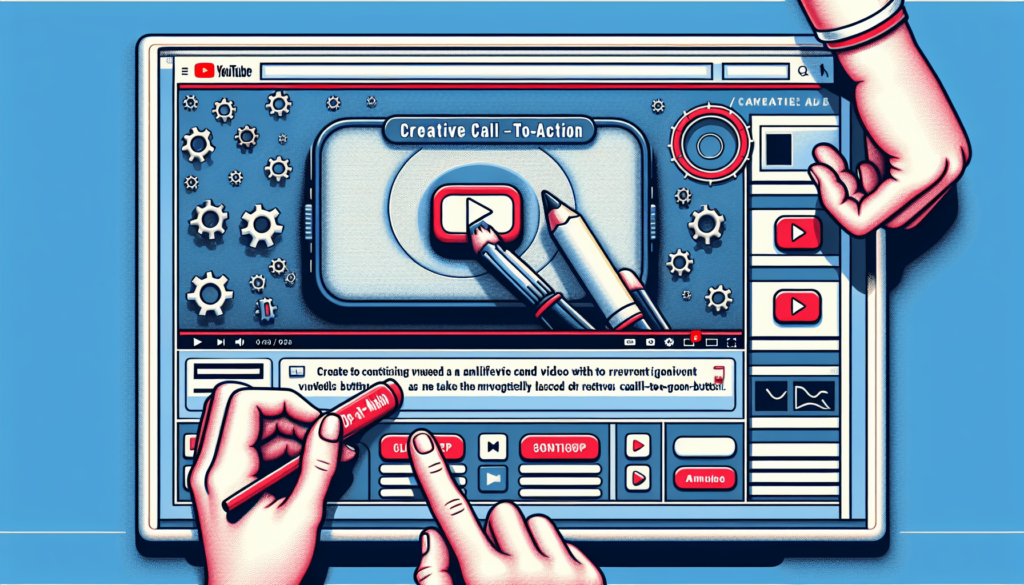Ever wanted to supercharge your YouTube Ads with compelling call-to-actions (CTA) that drive viewers to take action? Embarking on this journey, you’ll learn how to craft a persuasive call-to-action for your YouTube Ad compelling enough to grab your viewer’s attention and spur them into action. From the perfect wording to the strategic placement, this article promises to be your perfect guide in boosting viewer engagement and enhancing your digital marketing success on YouTube.

Understanding the Concept of Call-to-Action (CTA)
In the world of digital marketing, certain tools and strategies are designed to engage the viewer and encourage them to take a specific action. Among these is the call-to-action (CTA), a key instrument that has the potential to greatly influence the success of your online marketing campaigns.
Defining Call-to-Action (CTA)
A call-to-action can be described as a prompt on a digital medium, which urges the viewer or user to perform a specific action. CTAs often come in the form of clickable buttons or links, with phrases such as “Sign Up,” “Buy Now,” or “Learn More.”
Why is a Call-to-Action important?
A well-framed CTA serves as a guidepost that steers your potential customers to your desired course of action. It helps transform passive browsing into purposeful engagement, ultimately leading to conversions. Without a clear CTA, viewers might not know what step to take next, resulting in missed opportunities from both the customer and marketer’s perspective.
The role of CTA in YouTube Advertising
YouTube, being a video-based platform, offers unique opportunities for marketers. In YouTube advertising, a CTA can be an invitation to subscribe to a channel, watch another video, or visit a website. It plays a crucial role in exploiting the power of visual persuasion, thus leading to increased scopes for conversions.
Setting up Your YouTube Ad
Here’s where it all begins – the ad setup. Creating an ad that resonates with your audience requires careful planning and strategic thinking.
The YouTube Ad creation process
Creating a YouTube Ad involves multiple steps, starting with deciding the campaign type, setting your budget, and targeting your audience. Next, you decide on the ad format, create your video, and finally, design and implement your CTA.
Choosing the suitable Ad format
YouTube offers various ad formats – from skippable and non-skippable video ads to discovery ads and overlay ads, each designed for different purposes. Your choice of ad format should align with the nature of your message, your target demographic, and your campaign objectives.
Determining Ad goals and target audience
Before you proceed with your ad, you need to identify your primary goal. Is it to increase brand awareness, generate leads, or boost sales? Knowing your objective will help you streamline your focus and target the right audience, thereby increasing the effectiveness of your CTA.
Writing Your Call-to-Action (CTA)
Crafting a CTA that compels users to take action isn’t always straightforward. It’s about striking the right balance between creativity and directness.
The importance of persuasive language
Your CTA must be compelling and appeal to your viewers’ interests. The language should be persuasive but not aggressive. Users should feel that clicking on the CTA is beneficial to them and not just a required step for you.
Creating a sense of urgency
A well-written CTA conveys a sense of urgency. Words and phrases like “Limited Time Only!”, “Hurry!”, or “Offer ends soon!” instigate viewers to take immediate action and avoid missing out.
Using action-oriented verbs
CTAs start with a strong command verb. You’re not just subtly suggesting, you’re directing the user towards an advantageous action. “Download”, “Subscribe”, “Buy”, “Start” are all examples of action-oriented verbs that immediately clarify what step to take next.
Embedding CTA in Your YouTube Ad
Located strategically, your CTA can guide viewers smoothly from the video content to the proposed action, all in a matter of moments.
Where to place your CTA
A general rule of thumb for CTAs in YouTube ads is to place them towards the end of your video. However, it’s critical to consider user behavior. Based on the average view length, make sure your CTA appears within the span where most viewers are still watching.
How to integrate CTA within the Ad narrative
Your CTA should blend seamlessly with your video’s narrative. It’s always a best practice to offer some context before the CTA appears. A well-placed transition from the story to the CTA helps maintain the flow and continuity of the video ad.
Optimal duration for presenting the CTA
There’s no hard and fast rule about how long your CTA should remain visible, but it should be on-screen for enough time that viewers can read and process it. Too fleeting, and viewers may miss it; too long, and it can be annoying.

Designing a CTA Button
Your CTA is much more than just words; its visual elements can have significant effects on click-through rates.
Popular types of CTA buttons
CTA buttons vary from a simple text link to interactive buttons. Some CTAs invite users to click on a button, others are made appealing with the use of icons, while some leverage the power of animation to draw attention.
Choosing an appropriate design for your CTA button
The design of your CTA button should be consistent with your brand’s style guide. Typographic choices, shape, size and colors – all contribute to make the button visually attractive, recognizable, and engaging.
Importance of CTA button’s color and size
The CTA button should be prominently displayed in a contrasting color and should be large enough to be viewed comfortably across all devices. It has to catch the eye without appearing obtrusive.
Mentioning the Benefits
To make your CTA effective, it’s essential to communicate what benefits viewers will gain by clicking on it.
Highlighting what viewers gain from clicking the CTA
Clearly outlining the benefits of responding to your CTA prompts viewers to take the desired action. Are they going to learn something new, get a discount, or solve a problem by clicking on the CTA? Your audience needs to know.
Using incentives and offers
CTAs offering incentives tend to be more effective. Discounts, free trials, or giveaways are powerful incentives that often encourage users to take the desired action.
Showcasing unique proposition of your product/service
If your product/service has a unique selling proposition (USP), don’t hesitate to highlight it in your CTA. It adds to the attractiveness of your offer, and audiences are more likely to respond positively.

Using CTA Overlays
CTA overlays are clickable text or images that appear as a layer above your ad and direct viewers to take specified actions.
Explaining the function of CTA overlays
CTA overlays serve as an explicit invitation. Whether to visit your website, download an ebook, subscribe to a newsletter, or make a purchase — the overlay makes the CTA stand out, leading to potentially higher click-through rates.
How to add a CTA overlay to your YouTube ad
To add a CTA overlay, simply go to your Google Ads account, navigate to the video campaigns section, and choose the video to which you want to add the overlay. Fill out the necessary fields, and voila, your overlay is ready!
Devising effective overlays for better performance
Good overlays echo the main message of the video, use persuasive language, and are visually appealing. Once again, make sure your CTA overlays highlight the benefits that viewers stand to gain.
Incorporating CTA in Video Description
Your YouTube video description is another crucial area to include your CTA.
Guidelines for writing a engaging video description with CTA
An effective video description is concise, engaging, and includes a clear CTA. It should provide viewers with a synopsis of the video, include relevant keywords, and end with a well-placed CTA.
Importance of including CTA link in description
Including a CTA link in your description enables viewers to take immediate action from the video page itself. This is particularly useful for viewers who may miss the CTA in the video or prefer to explore more before deciding.
Examples of successful descriptions with CTAs
Many YouTube marketers excel at framing descriptions with CTAs. “Ready to take your cooking game to the next level? Enroll in our masterclass here!” or “Enjoying our fashion tips? Click here to subscribe and never miss an update!” are examples of engaging CTAs within video descriptions.

Testing the Effectiveness of Your CTA
Post launch, the work doesn’t end. It’s important to analyze your CTA’s performance to understand its effectiveness.
Assessing click-through rates
The click-through rate (CTR) measures the number of clicks your CTA receives relative to the number of total impressions. A high CTR indicates that your CTA is capturing viewer interest, while a low CTR might call for a review of your CTA design or placement.
Using analytics to measure CTA performance
YouTube analytics offers a wealth of data on viewer behavior, including engagement metrics like clicks, views, likes, shares, comments, and watch time. Regularly reviewing these metrics can help you understand how users are interacting with your CTA and adjust your strategy accordingly.
Making adjustments based on customer feedback
Analyzing your viewers’ responses – in the form of comments, likes, shares, or direct feedback – can give you valuable insights about the effectiveness of your CTAs. If your viewers find your CTA intrusive or unclear, you need to revise your strategy and make the necessary adjustments.
Real Life Success Stories and Lessons
Success stories provide valuable insight into the workings of a good CTA, and there’s always a lesson to be learnt from failure.
Analysing successful YouTube Ad Campaigns with effective CTAs
Several brands have leveraged the power of CTAs to drive immense success in their YouTube ad campaigns. From Nike’s inviting ‘Click to buy now,’ to Duolingo’s ‘Download now and learn a language for free,’ viewers knew exactly what action to take.
Understanding what works and doesn’t work in CTAs
An effective CTA strikes a balance between being persuasive without being pushy. It’s clear, specific, and resonates with what viewers want. On the flip side, generic, vague CTAs or those that sound salesy and demanding usually don’t perform well.
Adapting successful strategies to your need
While there are lessons to be learnt from successful campaigns, it’s important to remember that what works for one might not work for another. Always adapt strategies based on your brand goals, audience, and the context. This way, you can create CTAs that produce the results you desire.






